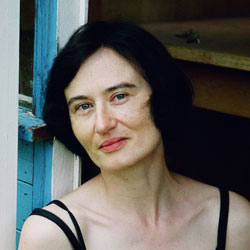In Forge, Jan Zwicky performs a balancing act of great poise and beauty. An extended set of variations on the theme of listening, the collection pays repeated attention to music – and through it, to the natural world and human relationships. Love and death are topics almost too risky to address directly, especially with this kind of breathless, caught-up writing: the stakes could not be higher. Zwicky addresses them fearlessly, making them meaningful and felt, and borrowing the languages of mystery, even religion, to do so. The payoff is real and extraordinary. Gracefully sustained, her unashamedly lyric verse always feels earned by, and earthed in, lived experience: whether of grief or companionship, those great conditions, or, repeatedly, of a watery world. This is a book gauzy with images of condensation, meltwater, flood and mist. It also manages the rare trick of taking on music’s abstract forms. For all her precision, this poet brings us close to the music of abstraction that lies near the heart of true verse.
Notes on the Poem
If you've followed the Griffin Poetry Prize Poem of the Week feature over the weeks, months and years (this is week 445 in our uninterrupted presentation of work from or associated with the prize's shortlists), we often use as our starting point the observations of our judges about the collections from which these poems came. These citations are thoughtful, well-crafted tributes that are beautifully compositions unto themselves. The citation for Jan Zwicky's 2012 Griffin Poetry Prize shortlisted collection Forge is strolls with contemplation and wonder through the work. This striking excerpt from the poem "Music and Silence: Seven Variations" ... "This is your perplexity: was it a hand that reached up, plucked the arrow in mid-flight?" ... isn't that an exquisite "balancing act of great poise and beauty"? As the poem opens the collection, it makes clear that much attention will be paid and much influence will be garnered from music. In "The Art of Fugue" (that musical influence, again), how much more directly, yet still compassionately, can one address death than this? "The dead are dead: parents, siblings, children, spouse. Death comes upon us: blindness, deafness, madness, or the slow gag of neglect. Put your arms around them: they are what is given, as you knew." ... and whether you view "them" as your loved ones or the causes of death, "putt[ing] your arms around them" shows Zwickly fearlessly wielding love. Zwicky's fascination with the "watery world" is indeed evident throughout the collection, but she is also reverent and, as noted before in this citation, balanced: "The water's neither cold nor warm. Your mind has never been as clear." Once you've read this citation, you are eager to take the same journey through this work that the Griffin Poetry Prize judges did. The following are other selected judges' citations that present Griffin Poetry Prize winning and shortlisted works in gorgeously appreciative, often spirited fashion.
- Men in the Off Hours by Anne Carson Griffin Poetry Prize 2001 - Canadian Winner (Judges: Carolyn Forche, Dennis Lee, Paul Muldoon)
- Born to Slow Horses by Kamau Brathwaite Griffin Poetry Prize 2006 - International Winner (Judges: Lavinia Greenlaw, Lisa Robertson, Eliot Weinberger)
- Ocean by Sue Goyette Griffin Poetry Prize 2014 - Canadian Shortlist (Judges: Robert Bringhurst, Jo Shapcott, CD Wright)
- Conflict Resolution for Holy Beings by Joy Harjo Griffin Poetry Prize 2016 - International Shortlist (Judges: Alice Oswald, Tracy K Smith, Adam Sol)
- The Perseverance by Raymond Antrobus Griffin Poetry Prize 2019 - International Shortlist (Judges: Ulrikka Gernes, Kim Maltman, Srikanth Reddy)
